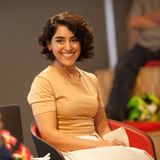There has been an immediate and overwhelming amount of solidarity visible in Amsterdam concerning the war in Ukraine. This solidarity is heartwarming for some and questionable for others. When we look at all conflicts of the past decades, why does this war cultivate this visible solidarity? This question is more specifically relevant to individuals in the art and culture sector originating from non-western conflict areas, representing a significant part of this sector in Amsterdam. How are they affected by this immediate response? To develop a relevant response and an inclusive and appropriate one takes self-reflection and dialogue with the ones who carry the war within their identities.
All episodes are narrated in English, moderated by Sahar Shirzad. Institutions like Stedelijk Museum, Foam, Storytelling Center and OBA will be joining us in the audience.
This spring, we will be looking for answers to these questions together in a triptych of episodes at Pakhuis de Zwijger. We will make an inventory of what is needed and through holding conversations and panels, we will offer a meeting platform for anyone and everyone who is interested. Over the next few weeks, we will explore the following in three episodes.
Would you like to stay informed about this program via our newsletter? Then register here now!
What role do cultural institutions play in times of war; what shortcomings do we have and what are the best practices?
This programme facilitates dialogue for self-reflection, inviting everyone who is engaged in the art and culture sector in Amsterdam. Various speakers will cover the following questions within this first edition of the series:
– What can cultural institutions do in times of political conflict, with war and violence worldwide?
– How do we define our role, and how do we respond in a relevant and inclusive way?
– What helpful practices can we share?
– Who should we involve in that process?
– What are the vulnerabilities of doing so?
– Can we develop practices that align with our principles as an institution and which we can apply in similar future situations?
What are the needs of artists & organizations with a refugee background?
How do we look back on our own actions, what lessons have we learned from the two previous programs and how can we make our role more relevant?
More about the speakers:
Sahar Shirzad is a writer, program maker and human rights activist. As a critical thinker, she works on translating complicated matters to a broad audience in creative ways. With Refugee Millennials, she created a platform for former refugees who have been living in the Netherlands for more than 20 years. She centralizes humanity and compassion by focusing on personal stories within polarizing topics, such as the failing refugee policies in the Netherlands. Currently, she works as an independent program maker and pushes an activist agenda in her work involving human rights.












